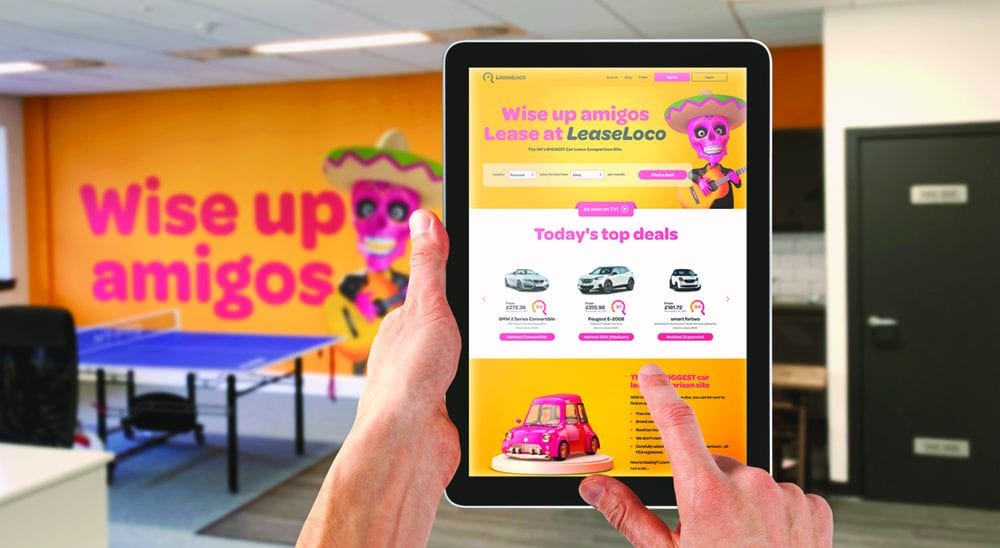How is technology changing the car purchasing experience for the consumer?

John Wilmot, CEO and founder at LeaseLoco shares three key ways the car purchasing experience for the consumer is changing for the better with the use of technology.
The technological revolution has changed everything we do, from the way we communicate to the way we shop. In a world of seamless customer experiences with huge amounts of choice and information at our fingertips through the likes of Facebook, Netflix and Spotify, people expect this level of simplicity and customisation in every industry – and the automotive industry is no different.
Here are three ways in which technology is being used to enhance the car-buying experience and serve the modern consumer.
Improving the customer car purchasing experience with algorithms
According to a recent study, automotive shoppers spend an average of nearly 14 hours researching cars online before making a decision. This means companies need to adjust their websites to give customers the simplest browsing experience and keep them engaged, making in-depth online research more informative and efficient than ever before. In the case of leasing, being flexible on the car make you lease is vital in getting the best deal, so LeaseLoco, the UK’s biggest car lease comparison site, has built a unique algorithm that gives an accurate value metric (into a meaningful score out of 100) so consumers can easily understand what a good deal looks like. LeaseLoco presents the user with the best value deals within their criteria; for example, you might be in the market for a BMW 3 series but the algorithm might rank a BMW 5 series with a higher score, and still within budget.
The leasing market is volatile, so this algorithm also informs the customer of historical prices on lease deals over time so that the deal can be viewed in context. Cars that catch a customer’s eye can be saved in a virtual garage where users will be notified if the price on their desired car drops. With up to eight million deals on the LeaseLoco site at any one time, manually tracking them would be impossible for the customer, whereas the historical price charts and trackers simplify this entirely.
Tools like LeaseLoco’s ensure customers are clued-up on what they’re looking at and are less likely to be pressured into an inconvenient purchase or mis-sold to.
Creating immersive experiences with VR and AR
We’re all getting pretty used to virtual environments during the pandemic, and some car retailers are now using this to give potential customers a feel for a new car’s driving experience through VR and AR. Shopping for a car is often difficult, with consumers facing many choices when finalising their decision or dealing with over-pushy salespeople, so seeing retailers employ technology to make the experience more engaging for the consumer is great.
VR is being used to provide a ‘test view drive’ video, giving customers a close-up and personal experience of driving a car by filming from the driver’s perspective and creating immersive content to bring products to life – an idea that’s both fun and pandemic proof! For example, Audi now uses VR to allow customers to see how different customisable options look on their cars before they make the purchase, while the carmaker also recently worked with Disney to create a VR experience at CES 2019 to show how technology can be used to bring driving moments into an interactive video game. In India, Kia launched a digital experience centre using AR and VR to create an immersive buying experience.
Whether at shopping centres, airports or sporting events, some carmakers are building pop-up VR-enabled experiences where consumers can try out their dream car instead of needing to travel to the showroom. As such, these technologies are helping to bring the car to the consumer, making the car-purchasing experience easier and more efficient.
Simplifying financing preapprovals and data aggregation
Customers don’t want to spend a lot of their time reading, researching and signing finance and insurance agreements and other legal documents when getting a new car. PwC’s research found incumbent financing options and experiences create ‘decision fatigue’ for many car shoppers, with negotiations often being long and involving too many steps and paperwork when financing a car.
Consumers want a faster, more transparent, and more convenient process, and this is where digital tools can be used to speed up and simplify the experience, increasing customer satisfaction. For example, financing preapprovals and finance protection product explanation tools can be leveraged to increase the consumer’s education and streamline the car-buying transaction. By using data aggregation capabilities, businesses can integrate information across dealer systems so that there is minimal friction within the final purchasing experience.
Auto industry players and fintech companies are partnering to improve financing experiences. San Francisco startup AutoFi began rolling out its technology in 2017 with Ford in Ohio to provide fast and efficient credit-decision processes to make the customer experience faster and smoother.
In an industry where competition for consumer attention is likely only to intensify in the wake of the pandemic, the industry needs to onboard new technologies to bring the car-buying experience up to the standard of consumer expectations. Consumers will value companies that are responding to their needs and providing a service fit for today, and which lets them find and buy the car they need with minimal friction and at the best price.
